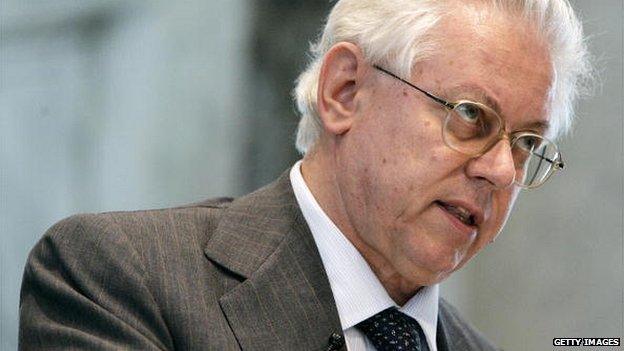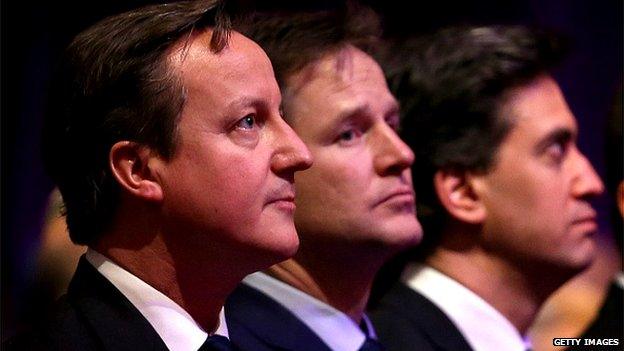Business and politicians – putting the Boots in
- Published
- comments

Stefano Pessina's weekend comments have elicited a sharp response from Labour
Boris Johnson once joked that the problem with the business sector was that it didn't much like democracy.
Voting, the London mayor told an audience of business leaders at Davos in 2013, was a rather pesky affair that got in the way of long term planning.
"Obviously, if businesses had their own way, they would get rid of all democratic consultations," Mr Johnson said in an interview following Davos.
"That way there would be no danger of Labour getting in and whacking up taxes, but that doesn't mean we're going to abolish general elections."
I'm not sure if Mr Johnson would stick to his "no abolition of general elections" if the alternative was a benign dictatorship under, say, him.
But, that to one side, there is an element of truth in what he says.
Businesses' biggest concern is the maintenance of consistency in the environment in which they operate.
That way they can plan over a number of years without the expectation of external shocks.
Business opinions
The problem is, for them, politics tends to be a rather inconsistent trade.
And during an election campaign, political volatility becomes more acute.
Business leaders are most concerned by a general "anti-business" attitude among many politicians determined to keep issues like tax planning (or tax "avoidance" as it is described by many) and remuneration in the headlines.
The attacks come from politicians of many different persuasions.
And come, business leaders argue, without due regard to the fact that private corporations create the wealth necessary for a functioning market economy.
And a well-funded state.
At the weekend some of this frustration bubbled into the open when the acting chief executive of Walgreens Boots Alliance, Stefano Pessina, told The Sunday Telegraph that a Labour victory would be a "catastrophe" for the UK, external.
It wasn't clear why - as Mr Pessina did not detail any policies he particularly disagreed with.
The Conservatives leapt on the attack, with George Osborne saying "this is a clear warning from the head of one of Britain's biggest employers about the economic catastrophe the UK would suffer if Ed Miliband's policies were put into effect".
Conservative sources told me they believe that business opinion still holds sway with the public - particularly with the economy on the up.
They will hope for several more such interventions during the campaign.

For many business leaders, politics tends to be a rather inconsistent trade
Warning to others
Labour is more circumspect about the need for chief executives of large companies to be seen and heard lining up behind them. (Maybe out of necessity, the Conservatives counter, as few of them support Mr Miliband whom even his allies say is not naturally pre-disposed to comfy chats with captains of industry).
And that is why, I am told, Labour decided that a "robust" response was necessary following Mr Pessina's remarks.
The shadow business secretary, Chuka Umunna, raised the fact that Mr Pessina didn't actually live in the UK, didn't pay tax in Britain and that questions had been raised about "firms that reportedly avoid making a fair contribution in what they pay [in tax]".
Alliance Boots was formally headquartered in Switzerland, though it said it did and does pay a significant amount of tax in the UK.
Senior Labour sources have told me that the decision was taken to go on the front foot on Mr Pessina as something of a warning to others.
If you are a company leader and you attack the leader of the Labour Party, then expect a strong response.
Labour bases this calculation on two things.
First, that leading chief executives coming out against them - or in favour of the Conservatives - could leave the public feeling that once again the establishment is governing the debate.
And the public are not huge fans of "the establishment" at the moment - as the SNP, UKIP and the Greens know.
Second, that most UK-based chief executives will be far more cautious when it comes to putting their oar into the general election debate if they know that the Leader of the Opposition will attack then straight back.
After all, Mr Miliband could well be the prime minister after the election.
Sir Martin Sorrell, the chief executive of the advertising giant WPP, predicted as much at the World Economic Forum two weeks ago.
And if you run a major company, relationships with the person in Number 10 tend to be important.
That may give chief executives pause for thought when they think about intervening in the election campaign.